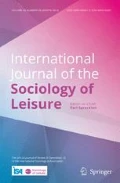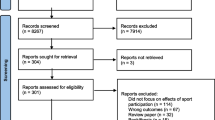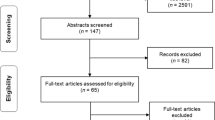Abstract
The focus of this paper charts sports role within the broader framework of exercising power and enforcing social control. From the start, I undertake a socio-historical analysis that seeks to explore the changing methods of implementing power and how they have evolved from industrial times to service a postindustrial setting. Through this prism, I examine sport, both as a central part of culture and as a policy area within post-war Britain. The contours of which, help the paper articulate the different roles sports policy has played within production and consumer-based societies, by exploring its metamorphosis from an area of social policy designed to instil discipline and set behaviours through a panoptic approach to governing. To now, becoming a central area of a modernised policy framework, built around the seductive workings of synopticism. Here, it is examined how elite sporting role models and the international success they acrue, are now used as sites of inspiration to motivate ordinary members of the public to be physically active. The contours of which, conform to a very different method of controlling populations and enforcing power from what was seen previously.
Similar content being viewed by others
Notes
The exact date reffering to the start of ‘The Enlightenment’ is debated, however, there is a general consensus that it took place within the mid-eighteenth century.
References
Adorno, T. (1998). Critical models: Interventions and catchwords. Colombia: Colombia University Press.
Adorno, T. (2001). The culture industry: Selected essays on mass culture. London: Routledge Classics.
Adorno, T., & Horkheimer, M. (1997). Dialectic of enlightenment: Philosophical fragments. New York: Verso.
Anderson, B. (1991). Imagined communities: Reflections on the origins and spread of nationalism. New York: Verso.
Bauman, Z. (1988). Modernity and the holocaust. Itacha: Cornell University Press.
Bauman, Z. (1991). Modernity and ambivalence. Itacha: Cornell University Press.
Bauman, Z. (1998). Globalization: The human consequences. New York: Colombia University Press.
Bauman, Z. (1999). Culture as Praxis. London: Sage.
Bauman, Z. (2000). Liquid modernity. Cambridge: Polity.
Bauman, Z. (2005). Liquid life. Cambridge: Polity.
Bauman, Z. (2006). Liquid fear. Cambridge: Polity.
Bauman, Z. (2007). Liquid times: Living in an age of uncertainty. Cambridge: Polity.
Bauman, Z. (2011). Collateral damage: Social inequalities in a global age. Cambridge: Polity.
Bauman, Z. (2012). This is not a diary. Cambridge: Polity.
Bauman, Z., & Haugaard, M. (2008). Liquid modernity and power: A dialogue with Zygmunt Bauman. Journal of Power, 1(2), 111–130.
Bauman, Z., & Lyon, D. (2013). Liquid surveillance. Cambridge: Polity.
Bauman, Z., & Tester, K. (2001). Conversations with Zygmunt Bauman. Cambridge: Polity.
Beck, U. (1992). Risk society: Towards a new modernity. London: Sage.
Beck, U. (2005). Power in the global age. Cambridge: Polity.
Beck, U. (2007). Beyond class and nation: Reframing social inequalities in a globalizing world. The British Journal of Sociology, 58(4), 679–705.
Beck, U., Giddens, A., & Lash, S. (1994). Reflexive modernization: Politics, tradition and aesthetics in the modern social order. Cambridge: Polity.
Berlin, I. (1969). Four essays on liberty. Oxford: Oxford Paperbacks.
Bloyce, D., & Smith, A. (2009). Sport policy and development: An introduction. Abingdon: Routledge.
Bogdaner, V., & Skidelsky, R. (1970). The age of affluence, 1951–1964. Basingstoke: Macmillan.
Bramham, P. (2008) Sports policy. In: K. Hylton and P. Bramham, Eds. Sport Development: policy, process and practice. Abingdon: Routledge.
Bramham, P., & Wagg, S. (2017). The British Labour Party, Social Justice and the Politics of Leisure 1945-2015. In J. Long, T. Fletcher, & B. Watson (Eds.), Sport, leisure and social justice. Abingdon: Routledge.
Brannagan, P. M., & Giulianotti, R. (2015). Soft power and soft disempowerment: Qatar, global sport and Football’s 2022 world cup finals. Leisure Studies, 34(6), 703–719.
Carmicheal, F., Grix, J., & Marques, D. (2013). The Olympic legacy and participation in sport: An interim assessment of sport England’s active people survey for sports studies research. International Journal of Sport Policy and Politics, 5(2), 229–244.
Carrington, B. (2010). Race, sport and politics: The sporting black diaspora. London: Sage.
Castells, M. (1996). The rise of the network society: The information age. Oxford: Blackwell.
Clarke, J., & Critcher, C. (1985). The devil makes work: Leisure in capitalist Britain. Basingstoke: Palgrave.
Coalter, F. (2007). A wider role for sport: Who’s keeping the score? London: Routledge.
Coalter, F., Long, J., & Duffield, B. (1988). Recreational welfare: The rationale for public sector investment leisure. Aldershot: Gower/Avebury.
Collins, M. (2008). Public policies on sport development: Can mass and elite sport hold together? In V. Girginov (Ed.), Management of Sport Development. Oxford: Butterworth-Heineman.
Collins, M. (2016). Social exclusion from sport and leisure: A decade of Progress or regress. In B. Houlihan & D. Malcolm (Eds.), Sport and society (3rd ed.). London: Sage.
Department for Culture, Media and Sport (DCMS). (2000). A sporting future for all. London: DCMS.
Department for Culture, Media and Sport (DCMS). (2008). Playing to win: A new era for sport. London: DCMS.
Department for Culture, Media and Sport (DCMS). (2015). Sporting future – A new strategy for an active nation. London: DCMS.
Department for Culture, Media and Sport/Strategy Unit (DCMS). (2002). Game plan: A strategy for delivering governments sport and physical activity objectives. London: Cabinet Office.
Eliassen, K. A., & Sitter, N. (2008). Understanding public management. London: Sage.
Fletcher, T. (2011). “The making of English cricket cultures”: Empire, globalisation and [anti] colonialism. Sport in Society, 14(1), 17–36.
Flintoff, A., & Scraton, S. (2001). Stepping into active leisure? Young Women’s perceptions of active leisure and their experiences of physical education. Sport, Education and Society, 6(1), 5–22.
Flynn, N. (2012). Public Sector Management. 6th Edition. London: Sage.
Foucault, M. (1970). The order of things. London: Routledge.
Foucault, M. (1977). Discipline and punish: The birth of the prison. London: Pantheon Books.
Foucault, M. (1991). Disciplines and sciences of the individual. In P. Rabinow (Ed.), The Foucault reader: An introduction to Foucault’s thought. London: Penguin.
Friedman, M. (1992). Capitalism and freedom. Chicago: University of Chicago Press.
Fromm, E. (2001). The fear of freedom. London: Routledge Classics.
Fukuyama, F. (1992). The end of history. New York: Free Press.
Giddens, A. (1991). Modernity and self-identity: Self and society in the late modern age. Cambridge: Polity.
Giddens, A. (1998). Conversations with Anthony Giddens: Making sense of modernity. Cambridge: Polity.
Giddens, A., & Cassell, P. (1993). The Giddens reader. Basingstoke: Palgrave.
Gilroy, P. (2002). There Ain’t no black in the union Jack: The cultural politics of race and nation. London: Routledge.
Giulianotti, R., Armstrong, G., Hales, G., & Hobbs, D. (2015). Sport mega-events and public opposition: A sociological study of the London 2012 Olympics. Journal of Sport and Social Issues, 39(2), 99–119.
Glyptis, S. (1989). Leisure and unemployment. Milton Keynes: Open University Press.
Green, M. (2004). Changing policy priorities for sport in England: The emergence of elite sport development as a key policy concern. Leisure Studies, 8(1), 77–92.
Green, M. (2007). Olympic glory or grassroots development? Sports policy priorities in Australia, Canada and the United Kingdom 1960-2006. International Journal of the History of Sport, 24(7), 921–953.
Green, M. (2009). Podium or participation? Analysing policy priorities under changing modes of sports governance in the United Kingdom. International Journal of Sport Policy and Politics, 1(2), 121–144.
Grix, J. (2009). The impact of UK sport policy on the governance of athletics. International Journal of Sport Policy, 1(1), 31–49.
Grix, J., & Carmicheal, F. (2012). Why do governments invest in elite sport? A polemic. International Journal of Sport Policy and Politics, 4(1), 73–90.
Habermas, J. (1985). The philosophical discourse of modernity: Twelve lectures. Cambridge: MIT Press.
Hargreaves, J. (1986). Sport, power and culture. Cambridge: Polity Press.
Hargreaves, J. (2002). The Victorian cult of the family and the early years of female sport. In S. Scraton & A. Flintoff (Eds.), Gender and Sport: A Reader. London: Routledge.
Hayek, F. (1944). The road to serfdom. London: Routledge.
Henry, I. (2001). The politics of leisure policy (2nd ed.). Basingstoke: Palgrave.
Hood, C. (1991). A public Management for all Seasons? Public Administration, 69(1), 3–19.
Horne, J., & Manzenreiter, W. (2006). An introduction to the sociology of sports mega-events. The Sociology Review, 52(2), 1–24.
Houlihan, B. (1997). Sport, policy and politics: A comparative analysis. London: Routledge.
Houlihan, B., & Green, M. (2009). Modernisation and sport: The reform of sport England and UK sport. Public Administration, 83(3), 678–698.
Houlihan, B., & Lindsey, I. (2013). Sport policy in Britain. Abingdon: Routledge.
Houlihan, B., & White, A. (2002). The politics of sports development: Development of sport or development through sport? London: Routledge.
Hylton, K. (2009). Race and sport: Critical race theory. London: Routledge.
Hylton, K. and Totten, M. (2013) Developing ‘sport for all’. In: K. Hylton. Eds. Sport Development: Policy, Process and Practice. London: Routledge.
Jackson, D. (2008) Developing sports practice. In: K. Hylton and P. Bramham. Eds. Sport Development: Policy, Process and Practice. London: Routledge.
Kirk, D. (1998). Schooling bodies: School practice and public discourse 1880–1950. London: Leicester University Press.
Lang, M. (2010). Surveillance and conformity in competitive youth swimming. Sport, Education and Society, 15(1), 19–37.
Long, J., & Spracklen, K. (2011). Positioning anti-racism in sport and sport in anti-racism. In J. Long & K. Spracklen (Eds.), Sport and Challenges to Racism. Basingstoke: Palgrave Macmillan.
Lukes, S. (2005). Power: A radical view. London: Palgrave Macmillan.
Luttwark, E. (2000). Turbo-capitalism: Winners and losers in the global economy. New York: Harper Collins.
Machiavelli, N. (2003). The prince. London: Penguin.
Mathiesen, T. (1997). The viewer society: Michel Foucault’s Panopticon revisited. Theoretical Criminology, 1(2), 215–234.
Newman, J. (2002). The new public management, modernisation and industrial change: Disruptions, Disjunctures and dilemmas. In K. McLaughlin, S. P. Osbourne, & E. Ferlie (Eds.), New public management: Current trends and future prospects (pp. 77–91). London: Routledge.
Oakley, B., & Green, M. (2001). Still playing the game at Arm’s length? The selective re-investment in British sport. Managing Sport and Leisure, 6(2), 74–94.
Ratna, A. (2015). Sport and south Asian diasporas: Playing through time and space. International Review for the Sociology of Sport, 50(6), 747–750.
Richards, D. and Smith, M. J, 2004. The ‘hybrid’ state: Labour’s response to the challenge of governance. In: S. Ludlam and M.J. Smith, Eds. Governing as new labour. Basingstoke: Palgrave MacMillan, 106–125.
Rowe, D. (2012). The bid, the lead-up, the event, and the legacy: Global cultural politics and hosting the Olympics. British Journal of Sociology, 63(2), 285–305.
Russell, D. (2013). The making of modern leisure: The British experience c.1850 to c.1960. In T. Blackshaw (Ed.), Routledge Handbook of Leisure Studies. London: Routledge.
Scraton, S. (1992). Shaping up to womanhood: Gender and girls’ physical education. Buckingham: Open University Press.
Scraton, S. (1994). The changing world of women and leisure: Feminism, ‘post-feminism’ and leisure. Leisure Studies, 13(4), 249–261.
Spracklen, K. (2009). The purpose and meaning of leisure: Habermas and leisure at the end of modernity. Basingstoke: Palgrave.
Spracklen, K. (2011). Constructing leisure: Historical and philosophical debates. Basingstoke: Palgrave.
Swain, S. (2017). Leisure in the current interregnum: Exploring the social theories of Anthony Giddens and Zygmunt Bauman. In K. Spracklen, B. Lashua, E. Sharpe, & S. Swain (Eds.), The Palgrave handbook of leisure theory (pp. 799–816). Basingstoke: Palgrave.
Swain, S. (2018). Grime music and dark leisure: Exploring grime, morality and synoptic control. Annals of Leisure Research, 21(4), 480–492.
Whigham, S., & May, A. (2017). ‘Sport for yes’? The role of sporting issues in pro-Independence political discourse during the Scottish Independence referendum campaign. International Journal of Sport Policy and Politics, 9(3), 99–119.
Author information
Authors and Affiliations
Corresponding author
Additional information
Publisher’s Note
Springer Nature remains neutral with regard to jurisdictional claims in published maps and institutional affiliations.
Rights and permissions
About this article
Cite this article
Swain, S. Sport, Power and Politics: Exploring Sport and Social Control within the Changing Context of Modernity. Int J Sociol Leis 2, 385–402 (2019). https://doi.org/10.1007/s41978-019-00040-4
Received:
Accepted:
Published:
Issue Date:
DOI: https://doi.org/10.1007/s41978-019-00040-4




